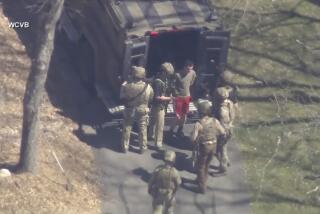Study of Other Bosnian Arms Sources Told
- Share via
WASHINGTON — Months after President Clinton secretly gave a green light to covert Iranian arms shipments to Bosnia, a top State Department official considered asking Muslim nations friendly to the United States to provide alternative sources of arms for the Bosnians, officials said Thursday.
Richard C. Holbrooke, then the newly named assistant secretary of State for European affairs, sought a legal opinion from the State Department’s attorneys in the fall of 1994 to determine how far U.S. diplomats could legally go to encourage the development of an alternative to the Iranian arms pipeline that had been launched in the spring of 1994, according to U.S. officials.
Holbrooke asked the attorneys what diplomatic approaches to friendly nations could be taken without triggering the U.S. laws concerning covert action--which would have required a written “presidential finding” authorizing a covert action--and also would have required congressional notification.
After Holbrooke received guidance from the State Department lawyers, however, his plan ran into high-level resistance at the White House.
For the last two weeks, Clinton administration officials have argued that Clinton gave tacit approval to Iranian arms shipments because there were no good alternatives. Yet the disclosure of Holbrooke’s proposal suggests that the White House actually shot down efforts within the administration to develop alternatives that might have diminished Iranian influence in Bosnia, which is now one of the greatest threats to the success of the U.S.-led peacekeeping mission there.
Senior administration officials opposed Holbroke’s plan because they feared that covert smuggling by friendly nations would make it too obvious that the United States was encouraging the violation of a U.N. arms embargo against Bosnia. Any direct U.S. involvement in arms shipments would also have meant that Washington would have to violate the U.N. Security Council resolutions calling for an international arms embargo.
At the time, Britain and France and other European nations with peacekeepers in the Balkans were opposed to U.S. diplomatic efforts to convince the U.N. to lift the arms embargo.
More to Read
Sign up for Essential California
The most important California stories and recommendations in your inbox every morning.
You may occasionally receive promotional content from the Los Angeles Times.










